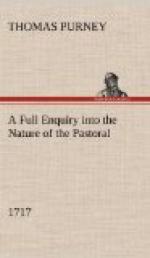Spencer’s Language is what supports his Pastorals; for I can maintain, that he has not above one Sentiment in fifteen but is either false, or taken from the Antients, throughout his Pastorals. The greatest Defect in his Language is it’s want of Softness. He has introduced a sufficient, or perhaps too great a Number, of Old-Words. But they are promiscuously used. He took not the Pains to form his Dialect before he wrote his Pastorals, by which means he has used more rough and harsh Old-Words, than Smooth and Agreeable Ones. They are used where our common Words were infinitely more Soft and Musical. As What gar’s thee Greet? For, What makes thee Grieve? How Harsh and Grating is the Sound of SPENCER’s two Words, But Instances were endless. He is the more blamable, because there are full enough Old-Words to render a Dialect Rustick and Uncommon of the most sweet and delightful Sound imaginable. As ween or weet, for think; yclepen, for call’d, and the like. These being so tender and soft, render the Language of Pastoral infinitely more tender also, than any common Words, now in use, can do.
CHAP. II.
How to attain to the Soft in Writing.
That a Shepherd should talk in a different Dialect from other People, is allow’d by all. That the Pastoral Language should be soft and agreeable is equally past dispute. The only remaining Question then is, what it is that composes such a Dialect, and how to attain it.
In order to compose a Pastoral Dialect entirely perfect; the first thing, I think, a Writer has to do, is, as we said before, to enervate it and deprive it of all strength.
As for the manner of enervating a Language, it must be perform’d by the Genius of the Poet, and not shown by a Critick. However when the Thing is done, ’tis not difficult to see what chiefly effected it. There are, I think, Cubbin, two Things that principally enervate your Language.
First, ’Tis perform’d by throwing out all Words that are Sonorous and raise a Verse. Mr. PHILIPS comes the nearest to a Pastoral Language of any English Swain but Spencer. And he has truly enervated his Language in four several Lines. One of which is the last of these two.
Ye Swains, I beg ye pass in silence
by;
My Love in yonder Vale asleep doth lye.
The Word Doth, is what enervates the last Line. But ’twould be still better enervated if Mr. Philips had used only such Words as have very few Consonants in them. For by Consonants, joyn’d with the Vowel O, a Writer may render his Language, in Epick Poetry, just as Sonorous as he will; and by the want of Consonants and by delighting in the other soft Vowels he may render it weak. I cannot see that Mr. PHILIPS has any Line where the Language is wholly enervated. But see how Spencer has done this. Especially in the second of these Lines.




